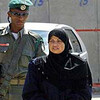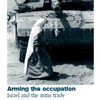Israeli forces break into Palestinian internet provider
16 July 2002
On Monday July 15, Israeli forces invaded the offices of the main Palestinian Internet service provider, PALNET, in Ramallah. They shut down its services to the West Bank and Gaza Strip for 24 hours and arrested six employees. Read more about Israeli forces break into Palestinian internet provider



